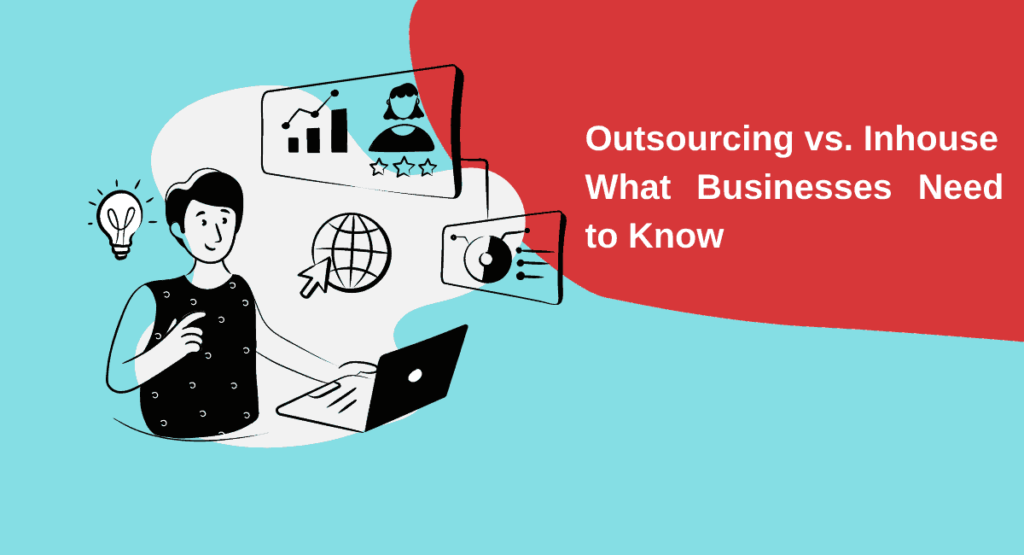

Outsourcing vs. inhouse work is a topic that often stirs up debates. On the one hand, the business goal is efficiency and productivity.
There are a lot of potential risks and things to consider before outsourcing work to independent contractors.
In this blog post, you will look at the pros and cons of outsourcing work and what businesses need to know before making that decision.
What is outsourcing, and what are its benefits of it for businesses
What drives the clients’ decisions is cost reduction.If there is no positive cost case, it will not happen. It is always about cost.”
Deloitte Global Outsourcing Survey 2020.
Outsourcing is the practice of hiring a professional organization to do tasks. Outsourcing helps businesses to save money and increase productivity.
Businesses can reduce their overhead costs and free up human capital to work on other projects by outsourcing tasks. Outsourcing allows companies to have the expertise of experienced professionals.
There are a few things to consider before outsourcing work to an external company. Businesses need to understand what they will get and what they will give up by outsourcing. They also need to make sure that the company they hire is reputable and has a good track record.
Outsourcing is good for businesses to increase efficiency and improve productivity. However, there are a few things to consider before deciding to outsource.
It can be very beneficial if businesses understand what they will get and what they will give up by outsourcing. So, companies should research this topic thoroughly before making any decisions.
What is in-house, and what are its benefits of it for businesses

In-house work can be more efficient, as employees are familiar with the company culture and procedures.
Additionally, in-house staff is more likely to be invested in the company’s success and be more productive.
There are, however, some drawbacks to in-house work. In-house staff can be more expensive than contractors, and they may not be available when needed. Additionally, businesses may find it difficult to scale up or down in-house staff as required.
In the end, businesses need to decide what is best for them. Outsourcing can be a great way to increase efficiency and productivity, but companies need to understand what they are giving up by outsourcing work.
How to decide which is the best for your business, outsource or inhouse?
Outsourcing work to independent contractors rather than employees is a great way for businesses to save money, but there are a few points to consider before making that decision.
Let’s take a look at the benefits and disadvantages of outsourcing work.
Outsourcing’s advantage is that it can save the business money. When a business outsources work, it doesn’t have to pay for benefits like health insurance, retirement plans, or paid vacation time.
Outsourcing also allows businesses to get work done more quickly and efficiently. Companies can hire workers from all over the world, so they’re not limited to just the people who live near them.
Finally, outsourcing can help businesses free up time and resources that they can use for other things. When companies outsource work, they don’t have to worry about managing employees or dealing with employee issues.
Outsourcing’s main disadvantage is that businesses can lose control of their work. When companies outsource work, they give someone else control of a part of their business.
Outsourcing can also be risky because businesses rely on someone else to do their work correctly and on time.
The pros and cons of both outsourcing and in-house work

There are many different arguments when it comes to outsourcing vs. inhouse work.
On the one hand, outsourcing can give companies access to a broader range of skills and expertise, often at a lower cost. This flexibility can be precious in sudden changes or challenges, allowing businesses to adapt quickly without worrying about building up their internal teams.
However, there are also potential drawbacks to outsourcing. It can lead to a loss of control and investment in an organization’s resources.
In some cases, outsourcing can even result in lower quality work being produced by external vendors who do not share the company’s values or priorities. Additionally, outsourcing represents a long-term commitment that may not consistently deliver immediate benefits and could cost more over time than doing things in-house.
Ultimately, whether outsourcing or staying in-house is the better choice depends on various factors specific to each company and situation.
While outsourcing may provide certain benefits like reduced costs or increased flexibility, it is essential for organizations to carefully weigh the pros and cons before deciding whether this approach is right for them.
When to outsource and when to bring work in-house

There are many situations in which it may be appropriate to outsource specific tasks and others in which it is better to keep work in-house. Ultimately, the decision will depend on several factors, including cost, access to specific resources, and more.
Outsourcing can be a great way to hire expertise that may not be available internally. For example, if your company has specific needs related to software development or coding that you do not currently have the capacity for in-house, outsourcing these tasks to an external team or firm may be a good solution.
This approach can help you access specific technical skills and expertise when needed without requiring permanent staff in these areas.
However, there are also situations where it may make sense to bring work in-house instead of outsourcing it. One key factor here is cost. While outsourcing specific tasks can often save money by freeing up resources at your company and making efficiency gains through specialized outside consultants, there may also be times when bringing detailed work back into your organization will save even more money over time.
For instance, if your company has specific regular needs for particular types of content creation or editing that come up frequently but are difficult to outsource because of particular requirements.
Tips for successfully outsourcing or in-housing work

Outsourcing or in-housing work can be a great way to project focus and support. There are a few key things to keep in mind when doing this:
Define the project
Be clear about what the project is, what it entails, and what the end goal is. Ensure that everyone is on the same page.
Have a plan
Having a plan will help to ensure that the project runs smoothly and efficiently. Make sure to have a clear timeline and milestones set so that you can track progress and ensure that deadlines are met.
Support
Ensure that you have the necessary support to complete the project. This includes having adequate resources, budget, and manpower.
Communication
Good communication is essential for any project, but it is crucial when outsourcing or in-housing work. Be sure the communication is open so that everyone is on the same page and issues can be quickly resolved.
Flexibility
Be prepared to be flexible throughout the project. Things will inevitably come up that were not planned for, so it is essential to be able to adapt and make changes as needed.
Outsourcing or in-hiring work can be a great way to improve efficiency and save money. Still, it is essential to carefully consider the pros and cons before deciding.
By understanding what you hope to achieve and what you are willing to give up, you can decide whether the approach is right for your company. Outsourcing can be a great way to gain access to expertise and resources, but it is not always the most cost-effective option.
Ultimately, the decision will determine what makes the most sense for your organization and its specific needs.
Why do companies make a product in-house rather than buy it?

There are some reasons why a company chooses to make a product in-house rather than buy it from another company.
It may be more cost-effective to produce the item oneself in some cases. By making the product in-house, the company has more control over the quality of the finished product and can ensure that it meets all the requirements.
Keeping the production process in-house allows companies to keep better track of their inventory and coordinate their manufacturing operations more efficiently.
Some companies simply feel that it is more important to have complete control over their product and its production, even if it means incurring higher costs. Ultimately, making or buying a product depends on several factors and must be made on a case-by-case basis.
Why outsourcing is not suitable for employees?
Outsourcing has been a controversial topic for many years. Some argue that it is an essential part of doing business in the modern world, while others contend it is detrimental to employees and the economy.
There are some reasons why outsourcing is not good for employees.
1. It can lead to job losses as companies move operations overseas in search of cheaper labor.
2. It can result in lower wages and fewer benefits for those who keep their jobs.
3. It can create a brain drain, as skilled workers leave their home countries searching for better opportunities elsewhere.
For these reasons, outsourcing is not good for employees or the economy.
What are the 4 types of outsourcing

There are four main types of outsourcing:
Performance-based
Performance-based outsourcing is generally used for non-core activities that performance indicators can measure.
Project-based
Project-based outsourcing is typically used for one-time or short-term projects
Staff augmentation
Staff augmentation is used to supplement an organization’s workforce with additional skills or expertise.
Captive
Captive outsourcing occurs when an organization outsources a function or activity to a subsidiary or sister company.
Each type of outsourcing has its benefits and drawbacks, so it’s essential to select the option that best fits the organization’s needs.
Conclusion
It’s time to compare the pros and cons of outsourcing vs. inhouse. Which is right for your business? The answer lies in your specific business objectives.
If you want faster turnaround times, better quality control, or more specialized skillsets, outsourcing will likely be better.
But if you value continuity and a close relationship with your team, keeping everything inhouse might be the best option. Regardless of your decision, always keep your business objectives top of mind!


